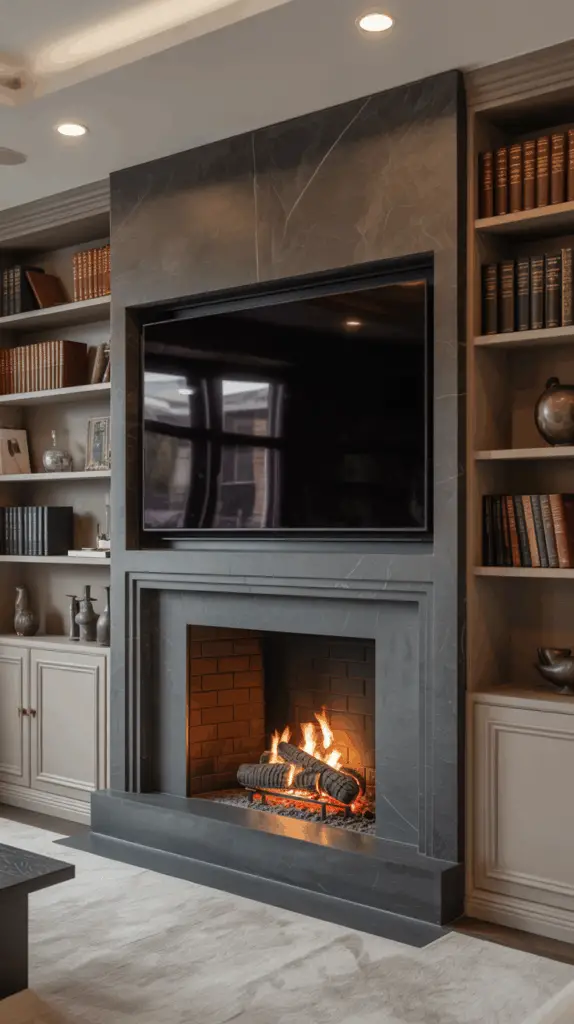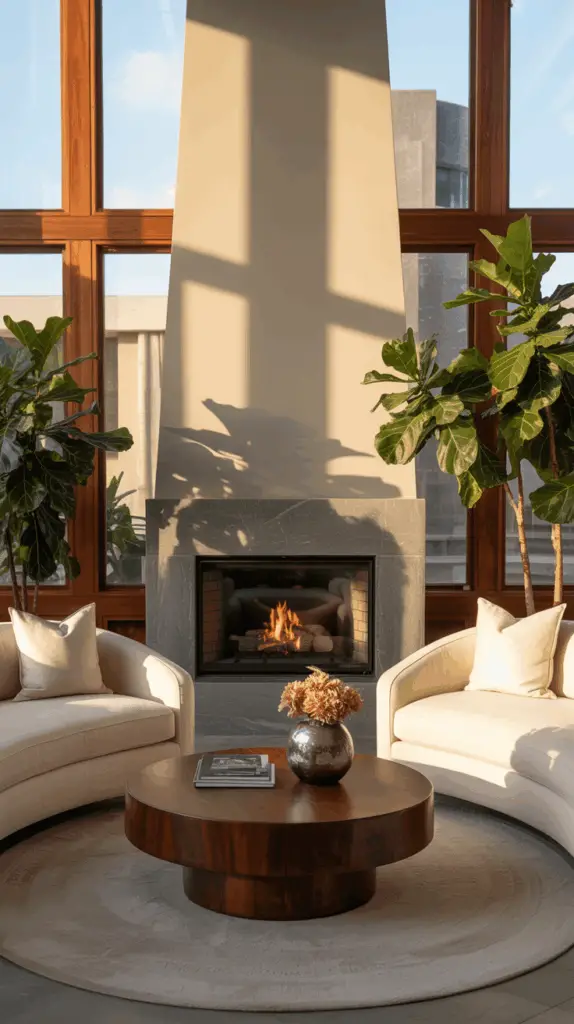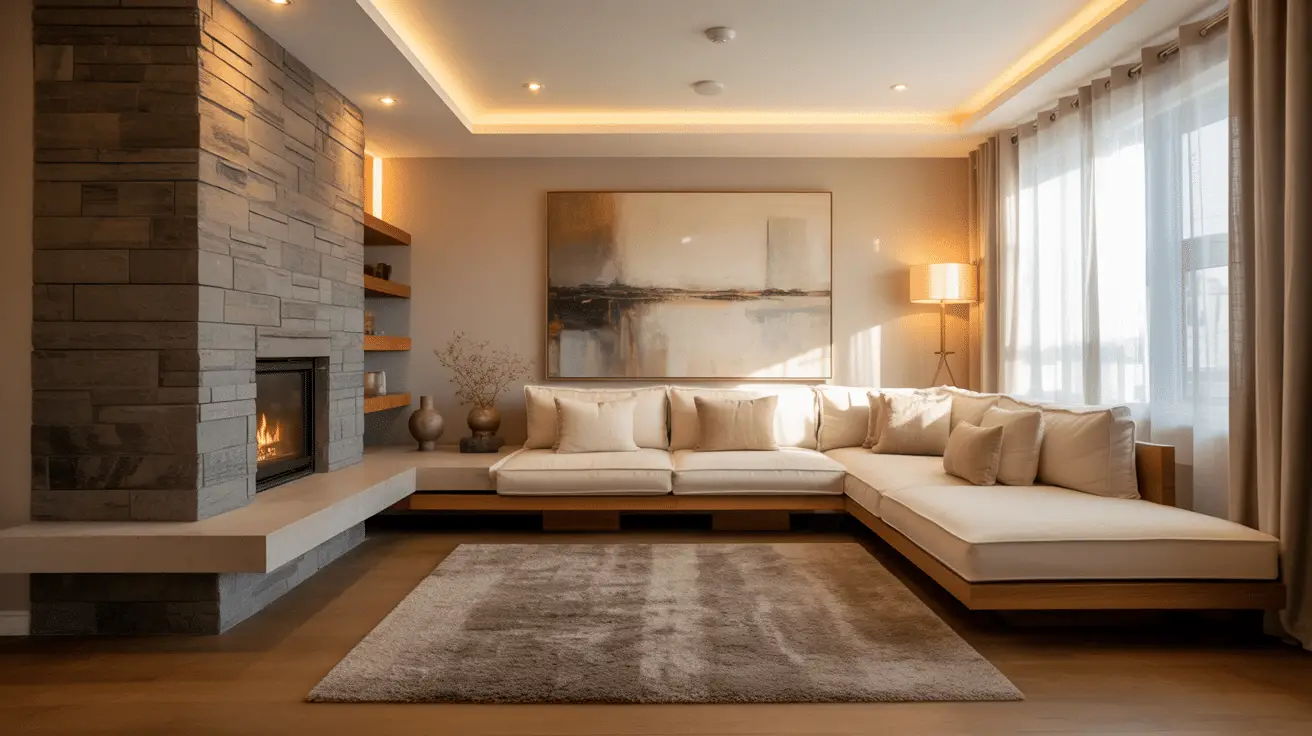10 Genius Ways to Style an Awkward Living Room Layout with a Fireplace
Table of Contents
Introduction
A fireplace is often the heart of a home, radiating warmth and charm. But what happens when your living room layout feels awkward—whether because of unusual dimensions, off-centered architecture, or limited wall space? Suddenly, the fireplace that should be your cozy focal point becomes a design challenge. Many homeowners struggle to balance comfort, flow, and style in a space that doesn’t easily lend itself to symmetry.
If you’ve ever found yourself rearranging furniture endlessly, unsure how to make your living room both functional and stylish, you’re not alone. In fact, studies in home design show that over 60% of homeowners rank “living room layout” as one of their most frustrating design dilemmas. The fireplace—while beautiful—often complicates the equation, especially if paired with large windows, corner placements, or open floor plans.
The good news? With a little creativity, you can transform even the most awkward living room into a stunning, cohesive space. In this article, we’ll explore ten genius strategies to style an unconventional layout, ensuring your fireplace shines while your living room feels inviting and balanced. From clever furniture arrangements to layered textures and focal point tricks, these ideas will help you create a living space you truly love.
Create Balance with Floating Furniture
When your fireplace doesn’t sit neatly in the center of a wall, the instinct might be to push furniture against the walls to “make space.” Instead, floating your furniture—placing sofas, chairs, or even sectional pieces away from the walls—creates a more natural flow. This method draws attention back to the fireplace while improving traffic patterns.
Think of the fireplace as the anchor. Arrange your primary seating—sofa or sectional—so it faces or slightly angles toward it. Add a coffee table within reach and a rug to define the zone. This floating arrangement ensures the room feels intentional rather than dictated by awkward architecture.
Table: Quick Floating Furniture Checklist
| Step | What to Do | Why It Works |
| 1 | Pull sofa away from wall | Creates cozy central zone |
| 2 | Angle chairs slightly | Balances asymmetrical layouts |
| 3 | Define area with rug | Visually anchors seating |
| 4 | Place console behind sofa | Adds storage + polish |
Use Dual Focal Points for Harmony
Many awkward living rooms suffer because the fireplace competes with another element—like a TV, large window, or built-in shelving. Rather than fighting for dominance, embrace dual focal points.
For instance, mount the television above the fireplace if proportions allow. If not, position the TV on an adjacent wall and create symmetry by placing art, mirrors, or tall shelving on the other side of the fireplace. This balances visual weight and prevents one element from overpowering the other.
Another option is to layer focal points. Add eye-catching décor on the mantel while framing the fireplace with built-in bookshelves. This way, the fireplace feels central without needing perfect symmetry.
Table: Dual Focal Point Solutions
| Challenge | Solution | Example |
| TV vs Fireplace | Place TV above mantel | Works best with modern fireplaces |
| Off-center Fireplace | Add shelving on opposite side | Balances proportions |
| Large Windows | Flank fireplace with décor | Mirrors, art, or tall plants |

Layer with Rugs for Zoning and Warmth
One of the most overlooked tricks in awkward living rooms is zoning with rugs. A well-chosen rug defines the conversation area around the fireplace, even if the room’s proportions feel uneven.
Start with a large area rug to cover the main seating space. If your room is extra spacious, layer smaller rugs to visually break up zones—for example, a reading nook near the fireplace or a secondary seating arrangement by a window. Choose textures that complement each other, such as a jute base layered with a plush wool accent rug.
Not only does this trick create warmth, but it also helps the fireplace feel like part of a cohesive design story rather than an architectural outlier.
Table: Rug Layering Ideas
| Base Layer | Top Layer | Style Result |
| Jute | Faux sheepskin | Cozy & rustic |
| Neutral wool | Patterned kilim | Eclectic chic |
| Sisal | Bold geometric rug | Modern statement |
Design Around Corners with Purpose
Corner fireplaces are notoriously tricky, but they offer unique opportunities. Instead of ignoring the diagonal angle, embrace it by arranging furniture to mirror the geometry. Place your main sofa facing into the corner at an angle, with chairs completing the triangle.
This creates an intimate conversation zone while keeping the fireplace central. Use corner shelving or plants to fill negative space, making the room feel complete.
You can also visually soften sharp angles with rounded furniture—curved sofas, circular coffee tables, or arched floor lamps. These subtle shapes bring harmony to otherwise harsh lines.
Table: Corner Styling Solutions
| Issue | Fix | Effect |
| Sharp angles | Curved furniture | Softer, inviting look |
| Empty corner space | Tall plant or lamp | Adds vertical interest |
| Limited symmetry | Floating chairs | Balances proportions |

Expand Storage and Style with Built-ins
Fireplaces often disrupt usable wall space, especially in smaller or oddly shaped rooms. The solution? Built-in shelving or cabinetry flanking the fireplace. Not only do built-ins add storage for books, media, and décor, but they also transform the fireplace into a central design feature.
Consider floor-to-ceiling shelving to add height and drama, or opt for lower cabinets with open shelving above for a lighter look. To maintain balance, style the shelves with a mix of functional and decorative elements: books, baskets, ceramics, and a few plants.
This built-in strategy works particularly well for narrow rooms, as it prevents the space from feeling cluttered while maximizing vertical storage.
Table: Built-in Styling Blueprint
| Element | Placement | Effect |
| Cabinets | Base level | Conceals clutter |
| Open Shelves | Above cabinets | Display personality |
| Lighting | Shelf accents | Adds depth & drama |
| Greenery | Mix throughout | Softens hard lines |
Play with Symmetry and Asymmetry
Not every living room calls for perfect balance—and sometimes leaning into asymmetry creates the most stylish outcome. If your fireplace is off-center, offset it with an oversized artwork, tall plant, or dramatic floor lamp on one side. This draws the eye intentionally and makes the layout feel curated rather than mismatched.
Alternatively, embrace symmetry where possible. Twin chairs facing the fireplace, paired sconces, or matching vases on the mantel give the illusion of order even if the architecture doesn’t cooperate.
Table: Symmetry vs. Asymmetry Guide
| Approach | When to Use | Visual Effect |
| Symmetry | Rooms with balanced windows | Calm, traditional |
| Asymmetry | Off-center fireplaces | Dynamic, modern |
| Hybrid | Large open layouts | Balanced yet flexible |
Highlight with Lighting Layers
Lighting can make or break how a fireplace-centered room feels. Use a combination of overhead, accent, and task lighting to highlight the fireplace without overwhelming it.
For instance, sconces flanking the mantel bring elegance, while a statement chandelier centers the seating zone. Add floor lamps in darker corners to balance uneven layouts. Layering ensures your fireplace remains cozy and welcoming at night.
Table: Lighting Plan Essentials
| Layer | Fixture | Purpose |
| Overhead | Chandelier | Defines center zone |
| Accent | Sconces | Highlights fireplace |
| Task | Floor/reading lamp | Adds function |
| Ambient | LED strip/fire glow | Warm atmosphere |
Conclusion
Awkward living room layouts with fireplaces may seem intimidating at first, but they’re full of hidden potential. By rethinking furniture placement, embracing dual focal points, layering rugs, or building out storage, you can transform challenging proportions into stylish and inviting spaces. Corner fireplaces become conversation starters, asymmetry turns into artistry, and clever lighting enhances both mood and flow.
Ultimately, a fireplace should feel like the warm heart of the home—not a design obstacle. With these ten strategies, you can embrace its character and create a living room that feels both functional and beautiful, no matter how unconventional the layout may be.

